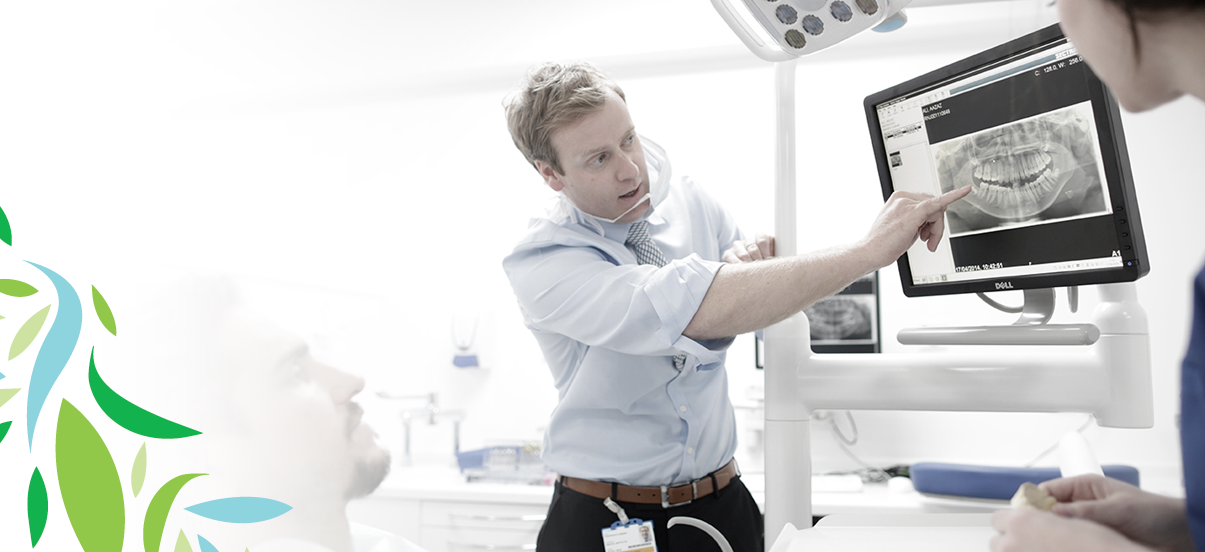
BioMinF remineralising toothpaste with active acid resistance
Remineralisation is tooth’s natural repair process. Acids from food and bacteria attack the tooth’s surface and cause minerals to be lost (demineralisation), remineralisation is the process whereby those minerals are replaced. When an imbalance occurs and demineralisation is greater than remineralisation, decay (caries) and ultimately cavities occur.
BioMinF remineralises the tooth’s surface and helps inhibit the demineralisation process.
Developed at Queen Mary University London, BioMinF has won a number of prestigious awards .

Remineralisation
For the remineralisation process to take place calcium and phosphate must be available within saliva. The addition of fluoride drives the remineralisation process and also hardens the tooth.
BioMinF shows a higher remineralisation rate
BioMinF shows a higher remineralisation rate than many retail remineralising kinds of toothpaste and dental products. Scientists beleive that the slow release of fluoride, calcium and phosphate of BioMinF is the reason for the high remineralisation rate.
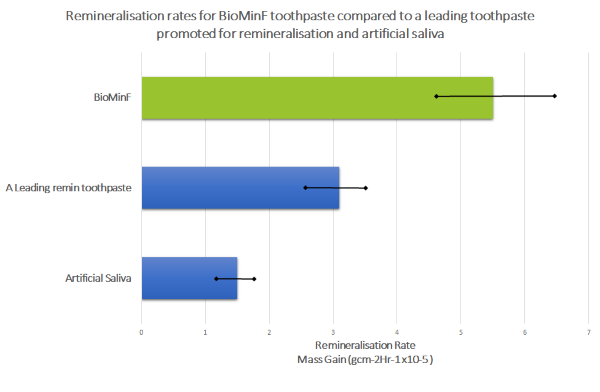
Data on file : Queen Mary University London
BioMinF uniquely delivers Calcium, Phosphate and Fluoride for up to 12 hours to drive remineralisation
BioMinF’s unique breakthrough technology enables it to deliver therapeutic levels of calcium, fluoride and phosphate for up to 12 hours. The end result is remineralisation with a fluorapatite armour, which is more resilient to future acid attack and dental decay.
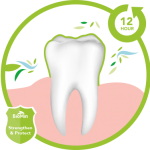
How does BioMinF work?
When you wash your teeth a thin coating of BioMinF is placed onto the tooth’s surface. That thin coating dissolves across the day, releasing essential Calcium, Phosphate and Fluoride ions. Using the tooth’s natural process, those ions remineralise, repair, strengthen and harden the teeth.
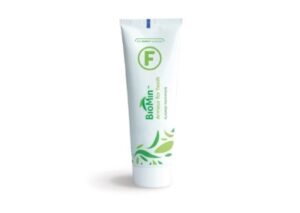
BioMinF retards demineralisation with active acid resistance
Acids in the mouth cause demineralisation, decay and cavities. BioMinFs breakthrough technology releases additional essential minerals when under attack from acids. This helps retard demineralisation in 2 ways:
-
- The release of minerals helps neutralise the acids.
- A fluorapatite armour coating is formed. This coating hardens the tooth and is more acid resistant.
6X longer fluoride availability.
Fluoride helps drive the remineralisation process. BioMinF’s patented technology makes therapeutic levels of fluoride available for up to 12 hours. Traditional kinds of toothpaste drop below therapeutic levels after approx 2 hours.
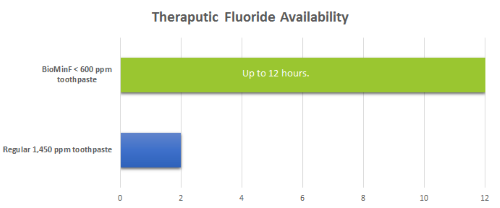
Gillam Et al, Dentine Hypersensitivity: Advances in Diagnosis, Management, and Treatment.
BioMinF your everyday toothpaste
BioMinF has been formulated to become your everyday toothpaste, not a separate treatment. Saving you time and money!
Family friendly low fluoride: Less than 1/2 the fluoride of regular toothpaste
BioMinF uses less than half* the fluoride levels of regular toothpaste. With fluoride being released in a controlled manner BioMinF uses fluoride more effectively.
* BioMinF Armour for Teeth® available fluoride content when packed 600 ppm. Standard toothpaste is generally 1400 to 1500 ppm.

Related articles
Benefits of fluorapatite
Enamel, Demineralisation and Remineralisation
Bioactive glasses dissolve under acidic conditions to protect teeth.
Fluorapatite is more resistant to acid than tooth enamel (hydroxyapatite) and hence gives greater protection against acid attack. Conventional toothpaste introduces fluoride during brushing, however, the fluoride rapidly diminishes at an exponential rate.
The outer layer of the tooth is known as the enamel, it is the hardest substance in the human body and because of this provides good resistance to abrasion and wear.
Fluorapatite is more resistant to acid than tooth enamel (hydroxyapatite) and hence gives greater protection against acid attack. Conventional toothpaste introduces fluoride during brushing, however, the fluoride rapidly diminishes at an exponential rate.
